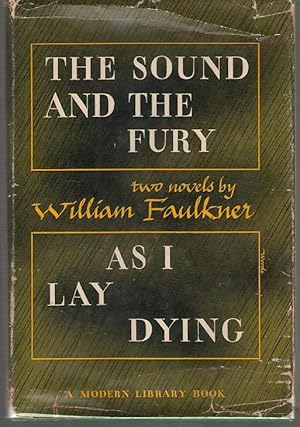

While most of Faulkner's characters are beyond the stage of infantile perception (but not all), the interplay of subject and object remains the basic concern of identity. As Gail Mortimer notes in her introduction to Faulkner's Rhetoric of Loss, the psychoanalytic development theory of object relations believes that "the newborn baby experiences existence as something of a continuation of the holistic harmony of the womb and that only gradually does the child come to give up this illusion" (2). Part of becoming, of forging an identity, requires the awareness and acknowledgment of the world as other. Without loss, writing is "not of the heart but of the glands" (Nobel Prize Address).

Coupled with the predominance of loss and substitution as continual motifs in The Sound and the Fury, it may indicate that perhaps Faulkner is trying to contrast the endurance of time-honored traditional values with the temporal necessity of making "something you can die with."Īccording to Faulkner, victories and defeats-what it means to endure and prevail-require radical and irretrievable loss: victories must leave scars. Much better the muddy bottom of a little doomed girl climbing a blooming pear tree in April to look in the window at the funeral" (232). In an introduction he later wrote for The Sound and the Fury, Faulkner notes, "It's fine to think that you will leave something behind you when you die, but it's better to have made something you can die with. It tells "the tragedy of a girl and her daughter" (Interview 232), a girl who has "nothing worth being lost that she can lose" (qtd. Faulkner's masterpiece, The Sound and the Fury, is a story about loss in its starkest form. Human actions are adjacent, but not contingent. Faulkner's novels occur in a world existing parataxically, events standing in proximity without connection. His novels explore and seek to achieve a conception of existence that relies on no illusions of preservation, no sustentation from any one cause to its supposed effect. Faulkner, as a defining author of the modernist period, understands and involves the dynamics of loss prominently in his writings. As long as the standard for loss remains as a watermark of value, no loss fully occurs as genuine loss. The loss of values in a post-structuralist era, if the trend is to endure, leads to and demands a greater relinquishment: even its own negation. Modern literature in general displays a certain fascination with loss. to save what did not need the saving, and lost instead yourself' (114). In his Nobel Prize acceptance speech, William Faulkner spoke of "defeats in which nobody loses anything of value." In Absalom, Absalom!, he wrote of making "that scratch, that undying mark on the blank face of the oblivion to which we are all doomed." (102) and of finding "that there was nothing to save who had hoped to save her.


 0 kommentar(er)
0 kommentar(er)
